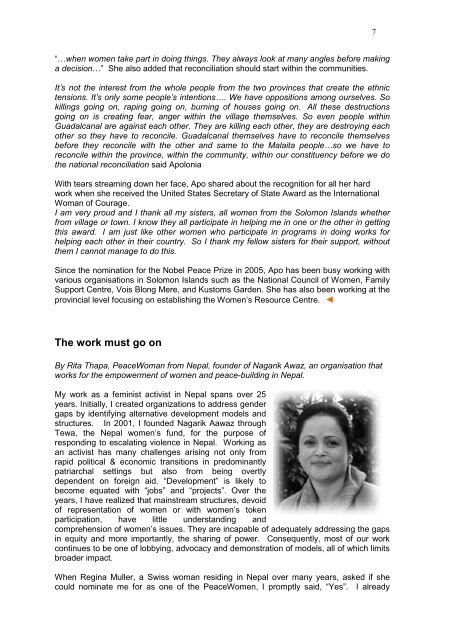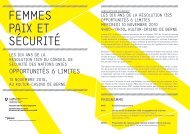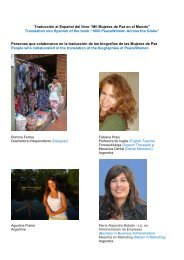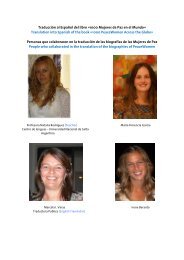FACES OF PEACE - Peace Women Across the Globe
FACES OF PEACE - Peace Women Across the Globe
FACES OF PEACE - Peace Women Across the Globe
Create successful ePaper yourself
Turn your PDF publications into a flip-book with our unique Google optimized e-Paper software.
7<br />
“…when women take part in doing things. They always look at many angles before making<br />
a decision…” She also added that reconciliation should start within <strong>the</strong> communities.<br />
It’s not <strong>the</strong> interest from <strong>the</strong> whole people from <strong>the</strong> two provinces that create <strong>the</strong> ethnic<br />
tensions. It’s only some people’s intentions…. We have oppositions among ourselves. So<br />
killings going on, raping going on, burning of houses going on. All <strong>the</strong>se destructions<br />
going on is creating fear, anger within <strong>the</strong> village <strong>the</strong>mselves. So even people within<br />
Guadalcanal are against each o<strong>the</strong>r. They are killing each o<strong>the</strong>r, <strong>the</strong>y are destroying each<br />
o<strong>the</strong>r so <strong>the</strong>y have to reconcile. Guadalcanal <strong>the</strong>mselves have to reconcile <strong>the</strong>mselves<br />
before <strong>the</strong>y reconcile with <strong>the</strong> o<strong>the</strong>r and same to <strong>the</strong> Malaita people…so we have to<br />
reconcile within <strong>the</strong> province, within <strong>the</strong> community, within our constituency before we do<br />
<strong>the</strong> national reconciliation said Apolonia<br />
With tears streaming down her face, Apo shared about <strong>the</strong> recognition for all her hard<br />
work when she received <strong>the</strong> United States Secretary of State Award as <strong>the</strong> International<br />
Woman of Courage.<br />
I am very proud and I thank all my sisters, all women from <strong>the</strong> Solomon Islands whe<strong>the</strong>r<br />
from village or town. I know <strong>the</strong>y all participate in helping me in one or <strong>the</strong> o<strong>the</strong>r in getting<br />
this award. I am just like o<strong>the</strong>r women who participate in programs in doing works for<br />
helping each o<strong>the</strong>r in <strong>the</strong>ir country. So I thank my fellow sisters for <strong>the</strong>ir support, without<br />
<strong>the</strong>m I cannot manage to do this.<br />
Since <strong>the</strong> nomination for <strong>the</strong> Nobel <strong>Peace</strong> Prize in 2005, Apo has been busy working with<br />
various organisations in Solomon Islands such as <strong>the</strong> National Council of <strong>Women</strong>, Family<br />
Support Centre, Vois Blong Mere, and Kustoms Garden. She has also been working at <strong>the</strong><br />
provincial level focusing on establishing <strong>the</strong> <strong>Women</strong>’s Resource Centre. ◄<br />
The work must go on<br />
By Rita Thapa, <strong>Peace</strong>Woman from Nepal, founder of Nagarik Awaz, an organisation that<br />
works for <strong>the</strong> empowerment of women and peace-building in Nepal.<br />
My work as a feminist activist in Nepal spans over 25<br />
years. Initially, I created organizations to address gender<br />
gaps by identifying alternative development models and<br />
structures. In 2001, I founded Nagarik Aawaz through<br />
Tewa, <strong>the</strong> Nepal women’s fund, for <strong>the</strong> purpose of<br />
responding to escalating violence in Nepal. Working as<br />
an activist has many challenges arising not only from<br />
rapid political & economic transitions in predominantly<br />
patriarchal settings but also from being overtly<br />
dependent on foreign aid. “Development” is likely to<br />
become equated with “jobs” and “projects”. Over <strong>the</strong><br />
years, I have realized that mainstream structures, devoid<br />
of representation of women or with women’s token<br />
participation, have little understanding and<br />
comprehension of women’s issues. They are incapable of adequately addressing <strong>the</strong> gaps<br />
in equity and more importantly, <strong>the</strong> sharing of power. Consequently, most of our work<br />
continues to be one of lobbying, advocacy and demonstration of models, all of which limits<br />
broader impact.<br />
When Regina Muller, a Swiss woman residing in Nepal over many years, asked if she<br />
could nominate me for as one of <strong>the</strong> <strong>Peace</strong><strong>Women</strong>, I promptly said, “Yes”. I already







